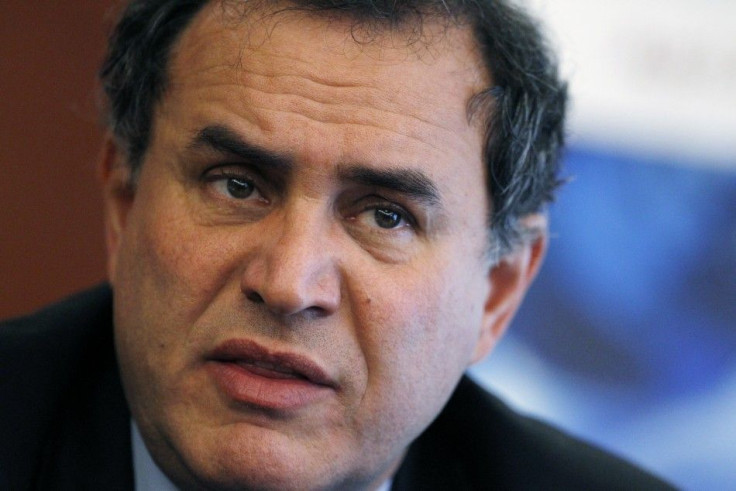Vacation Is Over, Euro Zone Crisis In 2012 Back: Roubini

Vacation is over and the euro zone crisis is back as the fundamental realities of high debt and low growth set in again, economist Nouriel Roubini of Roubini Global Economics says amid rising yields for Spanish and Italian sovereign debt.
The vacation Roubini referred to in a commentary published Friday was the temporary calm brought about by several euro zone government stimulus measures: the European Central Bank's €1 trillion ($1.3 trillion) of three-year loans to banks, Greece's orderly technical default that wiped off €100 billion off its debt and the enlargement of the region's bailout fund.
But yields on Spanish and Italian debt are rising again -- those on their 10-year bonds shot above to 6 percent and 5.5 percent, respectively, on Monday -- and the factors feeding this deterioration will only worsen forward, said Roubini, whose claim to fame is predicting the 2008 global financial crisis.
The euro zone recession is deepening and moving from peripheral states like Greece to core members like France. Roubini blamed the economic weakness on harsh austerity measures, which cut government spending and raise taxes.
He also said the strength of the common currency renders exports from peripheral members uncompetitive in the global market. The euro is currently trading at 1.31 versus the U.S. dollar, a level über-competitive Germany can withstand, Roubini said. But it would have to fall to parity with the U.S. dollar, a drop of nearly 24 percent, to accommodate exporters from peripheral countries like Greece.
Rising oil prices, partly due to geopolitical tensions in the Middle East, have also hurt the region's economy, said the New York University professor.
Moreover, the euro zone financial system, though it benefited from the ECB's massive loans, is now facing a capital shortage and must continue to sell assets and contract credit.
Roubini warned that weak economic growth will actually increase peripheral euro zone members' debt relative to gross domestic product, thereby negating the intended effect of austerity measures and potentially aggravating the region's sovereign debt crisis.
On the political side, France could soon elect a president (Francois Hollande) who disagrees with the fiscal compact framework backed by incumbent Nicolas Sarkozy and German Chancellor Angela Merkel, sparking fears of looming tensions between the two largest euro zone members that could hinder their ability to cooperate and bail out peripheral members.
Greece's general election could see the rise of political parties that support the country's exit from the euro zone. Italy and Spain, too, are showing signs of austerity and reform fatigue, noted Roubini, who warned that austerity measures without growth initiative will stoke social unrest.
More euro zone countries will be forced to restructure their debts, and eventually some will decide to exit the monetary union, he predicted.
While the deep, structural problems of the euro zone are widely noted in the financial community, not all are predicting the eventual demise of the currency union.
For example, David Rolley, a portfolio manager at Loomis, Sayles & Co., expects that when the euro depreciates enough, the euro zone's trade deficit, including those of periphery members, will shrink and give the region enough money to fund its governments.
© Copyright IBTimes 2024. All rights reserved.





















